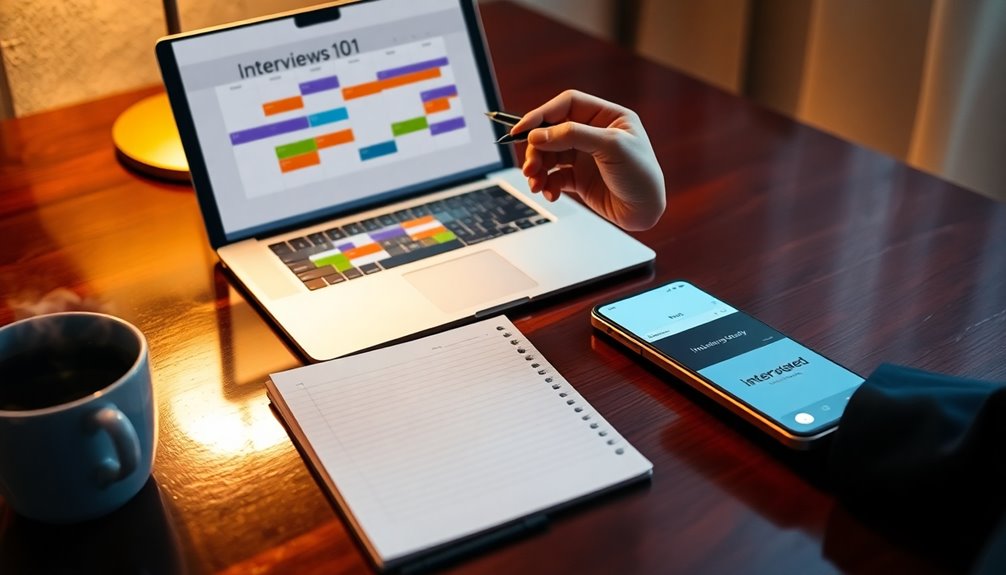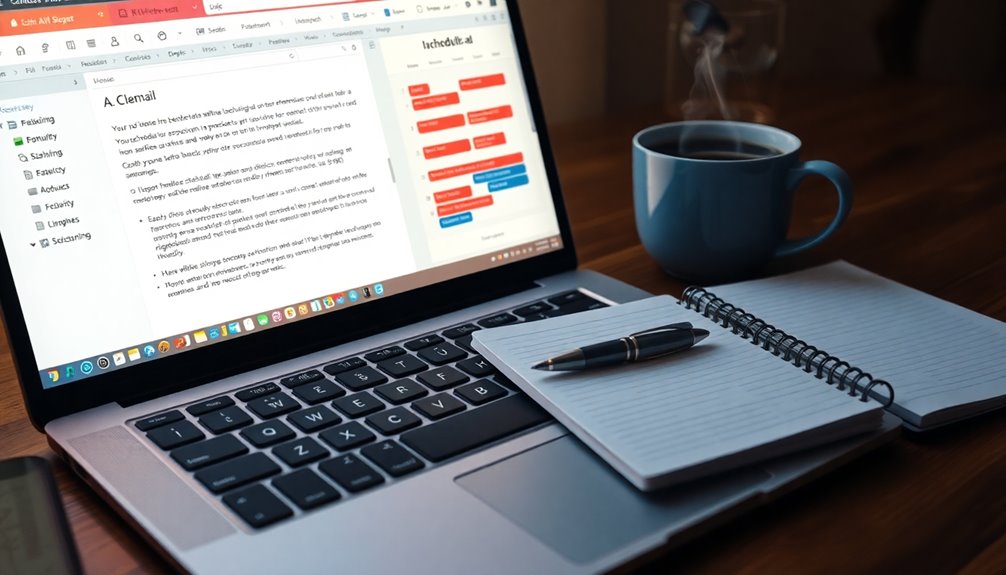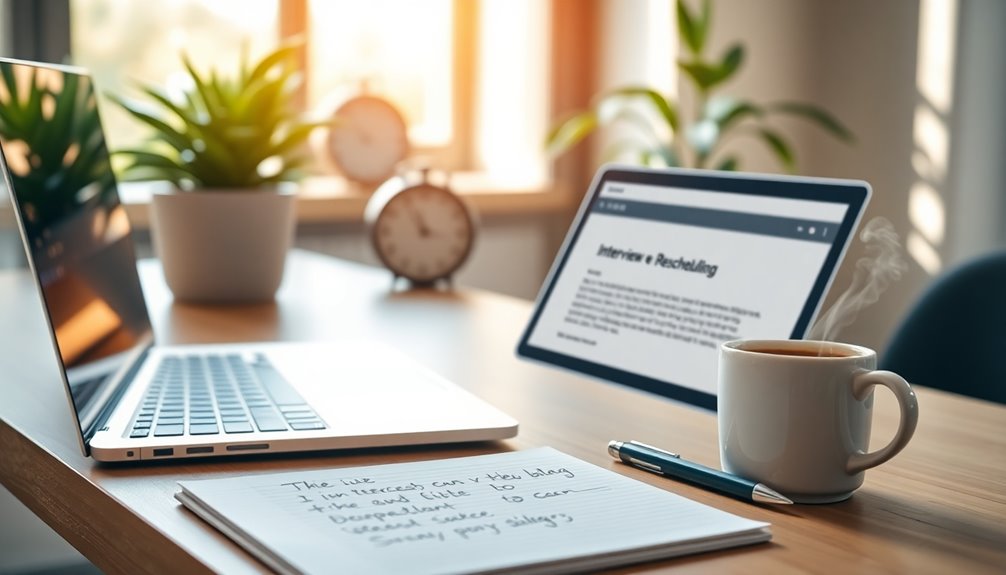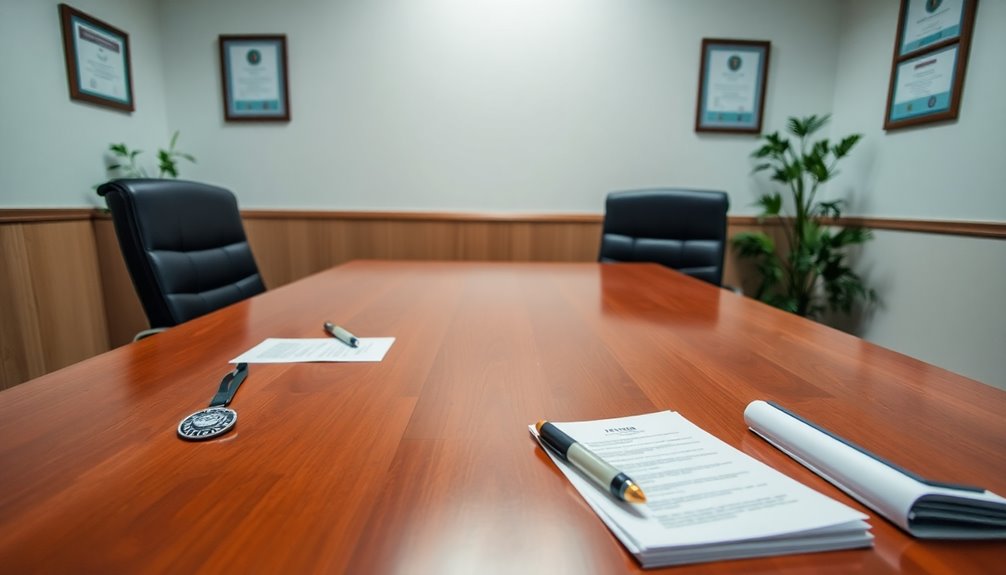Mastering the art of rescheduling interviews starts with knowing when it's necessary, like illness or family emergencies. As soon as you realize you can't attend, contact the hiring manager promptly. Explain your reason clearly and apologize for any inconvenience. Suggest two or three alternative times to show flexibility. In your email, express gratitude for the opportunity and your enthusiasm for the position. This approach not only reflects professionalism but also keeps you in good standing with the employer. Stick around for more tips on crafting the perfect email and ensuring a smooth rescheduling process!
Key Takeaways
- Notify the hiring manager as soon as you know you need to reschedule, showing respect for their time.
- Clearly explain your reason for rescheduling while maintaining professionalism and avoiding excessive detail.
- Suggest at least two or three alternative dates and times to demonstrate flexibility and consideration.
- Reiterate your enthusiasm for the position to reinforce your interest and commitment to the opportunity.
- Apologize for any inconvenience caused, expressing gratitude for their understanding and patience.
Understanding When to Reschedule

Understanding when to reschedule an interview requires a balance of professionalism and genuine circumstances. You'll want to identify justifiable reasons that merit a change.
For instance, if you're feeling ill, it's not only considerate to avoid spreading contagion, but it also reflects respect for the interviewer's time. Family emergencies can evoke sympathy, too, and hiring managers often understand that life can be unpredictable.
Similarly, vehicle issues or unexpected work schedule changes are typically seen as unavoidable. It's important to communicate these reasons clearly and promptly; this illustrates your professionalism and commitment to the opportunity.
Steps for Rescheduling Interviews

When you need to reschedule an interview, acting swiftly is key. Start by contacting the hiring manager as soon as possible to minimize disruption. Express your continued interest in the position and provide a concise reason for the change. Suggest multiple alternative times to make it easier for them.
Here's a quick reference table to guide you through the steps:
| Step | Action | Purpose |
|---|---|---|
| 1. Notify | Contact the hiring manager | Minimizes inconvenience |
| 2. Explain | Provide a clear reason | Shows professionalism |
| 3. Suggest Times | Offer multiple options | Increases chances of quick rescheduling |
| 4. Apologize | Express regret for the inconvenience | Demonstrates consideration |
Crafting a Rescheduling Email

Crafting a rescheduling email is crucial for maintaining professionalism and respect in the hiring process. Start by expressing gratitude for the opportunity.
Clearly state your reason for needing to reschedule, whether it's due to illness, a family emergency, or an unavoidable circumstance. This transparency helps the employer understand your situation.
Next, suggest multiple alternative dates and times for the interview to make it easier for them to accommodate you. Remember to convey your enthusiasm for the position, reinforcing your interest.
Finally, close your email with a sincere apology for any inconvenience caused, thanking them for their understanding. Keeping your email concise and respectful guarantees you leave a positive impression, even in challenging circumstances.
Sample Email Templates

Having a well-structured email template can make rescheduling an interview much easier.
Start your email by thanking the hiring manager for the opportunity. Clearly state your reason for rescheduling, whether it's due to illness, a family emergency, or another valid circumstance.
Next, propose a couple of alternative dates and times that work for you, showing flexibility. Reiterate your enthusiasm for the position to reaffirm your interest.
Finally, close your email with an apology for any inconvenience your rescheduling may cause, and express your appreciation for their understanding.
Here's a quick example: "I'm excited about the opportunity, but I need to reschedule due to a family commitment. Could we look at next Tuesday or Thursday? I apologize for any inconvenience."
Tips for Successful Rescheduling

Rescheduling an interview can feel intimidating, but following a few key tips can streamline the process.
First, reach out as soon as you realize you need to reschedule; this shows respect for the interviewer's time. Be honest but concise about your reason—whether it's illness or a family emergency—without oversharing.
Express enthusiasm for the role to remind the interviewer of your interest. When proposing new times, offer at least two or three options to make it easy for them.
Finally, apologize for any inconvenience caused; this shows professionalism and courtesy. Additionally, be sure to review your calendar to avoid potential scheduling conflicts in the future.
Frequently Asked Questions
How Can I Reschedule an Interview Without Losing Credibility?
To reschedule an interview without losing credibility, act quickly and communicate openly.
Contact the hiring manager as soon as you know you need to reschedule, and express your genuine interest in the position.
Provide a concise reason for the change, like illness or a family emergency, and suggest a few alternative dates.
Apologizing for any inconvenience shows respect for their time and helps maintain a positive impression throughout the process.
What Should I Do if the New Dates Are Not Convenient?
If the new dates aren't convenient for you, don't hesitate to communicate that.
Politely explain your situation and suggest alternative times that work better. It's important to maintain your enthusiasm for the interview, so express your continued interest in the opportunity.
Remember, flexibility is key, and hiring managers often appreciate your proactive approach.
Just be respectful and considerate in your communication, and you'll navigate this smoothly.
Is It Acceptable to Reschedule Multiple Times?
Did you know that 50% of candidates reschedule interviews at least once?
While it's acceptable to reschedule, doing it multiple times can create a negative impression. Employers might question your reliability or commitment.
If you find yourself needing to reschedule again, be sure to communicate clearly and express your genuine interest in the position. Always provide valid reasons and suggest alternative times to demonstrate your professionalism and respect for their schedule.
How Soon Should I Contact the Employer to Reschedule?
You should contact the employer as soon as you know you need to reschedule.
The sooner you reach out, the less inconvenience you cause for them. Ideally, aim for at least 24 to 48 hours before the scheduled interview. This shows professionalism and respect for their time.
When you do, express your enthusiasm for the opportunity and suggest alternative dates to make rescheduling easier for both of you.
Can I Reschedule an Interview via Phone Instead of Email?
Imagine your phone buzzing with an important call, and you're keen to discuss your interview. Yes, you can reschedule via phone!
Just make sure you're polite and professional. Start by expressing your enthusiasm for the opportunity, then clearly explain your reason for rescheduling.
Suggest alternative times, and don't forget to apologize for any inconvenience. A direct conversation can convey your sincerity and commitment, making a lasting impression on the hiring manager.
Conclusion
In conclusion, mastering the art of rescheduling interviews is essential for maintaining professionalism and enthusiasm in your job search. For instance, imagine you're feeling under the weather the night before a big interview. By promptly emailing the hiring manager to explain your situation and suggesting alternative dates, you not only show your commitment but also keep the lines of communication open. With these strategies, you can navigate rescheduling with confidence, leaving a positive impression even when plans change.









